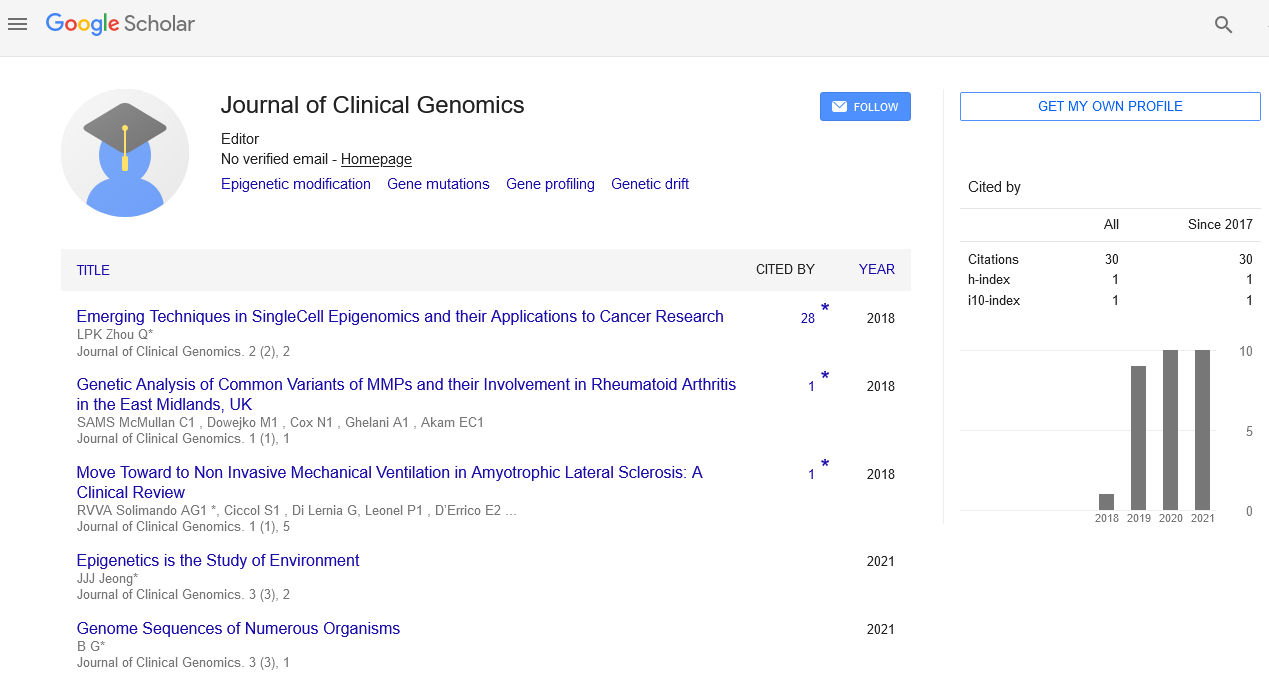Commentary, J Clin Genom Vol: 5 Issue: 3
Clinical Applications of Genomic Medicine: Future Perspectives
Noah Petry*
1Department of Biochemistry, University of Texas, Richardson, USA
*Corresponding Author: Noah Petry,
Department of Biochemistry, University of
Texas, Richardson, USA
E-mail: Pertrynoah6@gmail.com
Received date: 02 September, 2023, Manuscript No. JCG-23-116282;
Editor assigned date: 04 September, 2023, PreQC No. JCG-23-116282 (PQ);
Reviewed date: 18 September, 2023, QC No. JCG-23-116282;
Revised date: 25 September, 2023, Manuscript No. JCG-23-116282 (R);
Published date: 05 October, 2023, DOI: 10.4172/JCG.1000136.
Citation: Petry N (2023) Clinical Applications of Genomic Medicine: Future Perspectives. J Clin Genom 5:3.
Description
Genomic medicine has evolved significantly in recent years, becoming integral to diagnosing and treating a wide range of diseases Genomic medicine, the utilization of genomic information in healthcare, has witnessed tremendous growth, transforming our understanding of disease and patient care.
Current clinical applications
One of the current success stories of clinical genomics is its role in diagnosing rare genetic disorders. By sequencing an individual's genome, clinicians can identify previously unknown genetic mutations responsible for rare diseases, enabling early intervention and personalized treatment plans.
Oncology and precision medicine
In oncology, clinical genomics has ushered in an era of precision medicine. Genomic profiling of tumors allows for tailored therapies that target specific genetic alterations, enhancing treatment efficacy while minimizing side effects.
The role of Artificial Intelligence (AI):
Genomic data analysis and interpretation: The growing volume of genomic data poses challenges for interpretation. AI and machine learning algorithms are being harnessed to rapidly analyze large datasets, identifying clinically relevant genetic variations and predicting disease risks more accurately.
Drug discovery and development: AI-driven drug discovery, powered by genomics, is poised to revolutionize the pharmaceutical industry. By analyzing genomic data from patients, AI algorithms can identify potential drug targets and predict patient responses, expediting drug development.
Future prospects
Genomics in preventive medicine: Genomic information will increasingly be employed for disease prevention. Personalized risk assessments based on genetic profiles will allow healthcare providers to tailor preventive measures and screening programs for individuals at higher risk of specific diseases.
Enhancing rare disease treatment: The future will see a greater emphasis on developing targeted therapies for rare diseases. With advances in gene therapy and genome editing techniques like CRISPR-Cas9, it may become possible to correct genetic mutations underlying these disorders.
Cancer immunotherapy and immunogenomics: Immunogenomics will play a pivotal role in cancer treatment. Understanding the immune system's interaction with tumor genetics will lead to the development of more effective immunotherapies, improving cancer patient outcomes.
Pharmacogenomics: Pharmacogenomics will become more refined, enabling the creation of truly personalized medications. Drug dosages and treatment regimens will be tailored to individual genetic profiles, optimizing therapeutic outcomes.
Genomic medicine in infectious diseases: Genomic surveillance of pathogens will continue to be vital in combating infectious diseases. Rapid genomic sequencing of pathogens will facilitate the early detection and containment of outbreaks.
Ai-driven clinical decision support: AI will play an even more significant role in clinical decision-making. Integrating AI-driven clinical decision support systems into healthcare settings will enhance diagnostic accuracy and treatment recommendations.
Challenges and ethical considerations
The continued integration of genomics into clinical practice raises several challenges. Data privacy and security concerns must be addressed to protect patient genomic information. Ensuring equitable access to genomic medicine is another challenge, as it remains costly and may exacerbate healthcare disparities. Ethical considerations regarding informed consent and genetic discrimination require ongoing attention.
Conclusion
Genomic medicine has made substantial strides in recent years, reshaping the healthcare landscape. Its future prospects hold great promise, ranging from personalized disease prevention to advanced cancer treatments and AI-driven healthcare. However, addressing the associated challenges and ethical considerations will be important to realizing the full potential of genomic medicine. Through these concerted efforts, the genomic medicine to become an increasingly integral part of healthcare, leading to improved patient outcomes and the advancement of medical science.
 Spanish
Spanish  Chinese
Chinese  Russian
Russian  German
German  French
French  Japanese
Japanese  Portuguese
Portuguese  Hindi
Hindi 